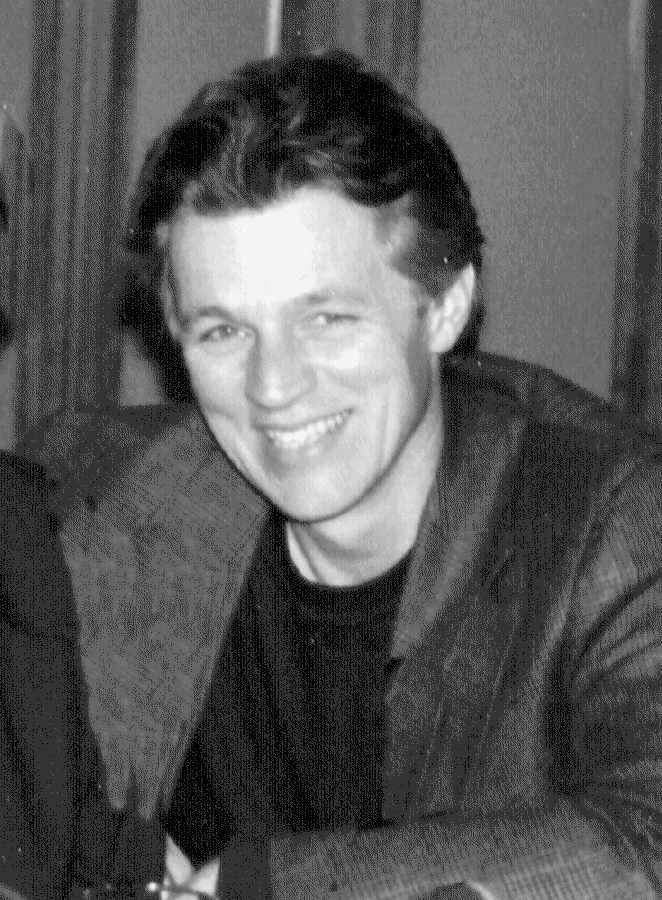John Needs Your Bone Marrow!
John Franc has leukemia, a cancer of the blood. Three years ago he underwent chemo-therapy and the disease went into remission. A few months ago it flared up again, and John has gone through another round of chemo-therapy. This time his doctors say the disease cannot be stopped by any procedure short of a bone marrow transplant. Without that transplant John may soon die.
John Franc started out as a graphic artist because he loves art, returned to school and became a teacher because he likes kids, and then became an engineer for the intellectual challenge. He is a skilled carpenter and screen printer, a master storyteller, and a wonderful friend. He has a great sense of humor and loves to travel. More than anyone else we know, John enjoys life and shares that joy with others.
To receive a transplant, John needs a "matched donor", that is a person with the same tissue type. Tissue type is a little like blood type, only a lot more complex, and much harder to match. Johnís known relatives have been typed and we have searched the available tissue donor databases, but no matches have been found.
Tissue type is inherited - half from your mother and half from your father - and varies with ethnicity - some types are found only in specific ethnic groups. Here is where Johnís hope lies and where you can help. Johnís paternal grandparents were Polish and his maternal grandparents were Ukrainian, all from the area around the city of Sanok in southeast Poland, very near the Ukrainian and Czech borders. As you can imagine, there are almost no recorded tissue donors in this area. But many Poles and Ukrainians have emigrated to the United States, just as Johnís grandparents did. These are the people who can save John! Someone with Polish and/or Ukrainian ancestry now living here in America can save Johnís life. We need to find that person!
How you can help. First, you and your friends and family who are from Poland or the Ukraine, or have parents or grandparents from that area, can register with your local marrow donor program. It takes only a few minutes and a simple blood test will determine if you are Johnís match. If you have sisters or brothers, encourage them to register - only rarely will they have the same type as you. And thereís a bonus - if you are not a match for John, you will be expanding the pool of potential donors for the many people who die each year because they cannot find a match.
Second, tell others about our search and encourage them to register. Spread the word at churches, schools, community centers and other places where people with Polish or Ukrainian ancestry congregate. There are lots of things that are special about being Polish or Ukrainian - now there is something else: you may be the person who can save Johnís life, or the life of another who shares your ancestry. Please help!
The Seven Steps to Donating Bone Marrow
REGISTER!
At a donor center or registration drive, you learn about what it means to be a marrow donor. You give 2-3 tablespoons of blood and consent to be listed in the main donor registry. (No marrow is given at the time you register.) Total time required is often no more than 15 minutes.
Your tissue type is determined and entered onto the donor registry.
A lab analyzes your blood to determine its tissue type (an altogether different thing than your blood type). The results are added to the registryís main computer, which is searched daily by Johnís doctors and doctors of other patients who need a marrow transplant.
If a preliminary match is found, you are contacted.
If the computerized registry indicates that your tissue type is close to Johnís or any of the patients in need, your donor center contacts you and arranges additional testing.
A "perfect match" is identified.
To find out whether you are a "perfect match," additional tests are done. If you do match, you will be given counseling and a physical exam.
You decide whether to donate.
After being fully informed about what it means to donate bone marrow, you make the decision to donate.
A small amount of your marrow is collected.
At a hospital near you, a small amount of your marrow is collected from the back of your pelvic bone with a special needle and syringe. Anesthesia is used during this simple surgical procedure.
You recover quickly from the procedure.
Typically, the donor stays overnight in the hospital. Afterwards, you can resume normal activity, although you may feel some soreness in your hip for several days. Your marrow naturally replenishes itself within a few weeks.
In todayís complex world there are few things that a person can do that so directly and so dramatically affect the life of another as donating bone marrow. Remember, unlike blood, each personís bone marrow is different from most other peoplesí. In a manner of speaking, we are all members of small and exclusive clubs, and when one of our fellow members needs help, only we can provide it.
|
Contact information:
|
